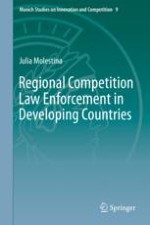2019 | OriginalPaper | Buchkapitel
13. Proposal on Re-Allocation of Competences in the WAEMU, AndeanC, CARICOM
verfasst von : Julia Molestina
Erschienen in: Regional Competition Law Enforcement in Developing Countries
Verlag: Springer Berlin Heidelberg
Aktivieren Sie unsere intelligente Suche, um passende Fachinhalte oder Patente zu finden.
Wählen Sie Textabschnitte aus um mit Künstlicher Intelligenz passenden Patente zu finden. powered by
Markieren Sie Textabschnitte, um KI-gestützt weitere passende Inhalte zu finden. powered by
